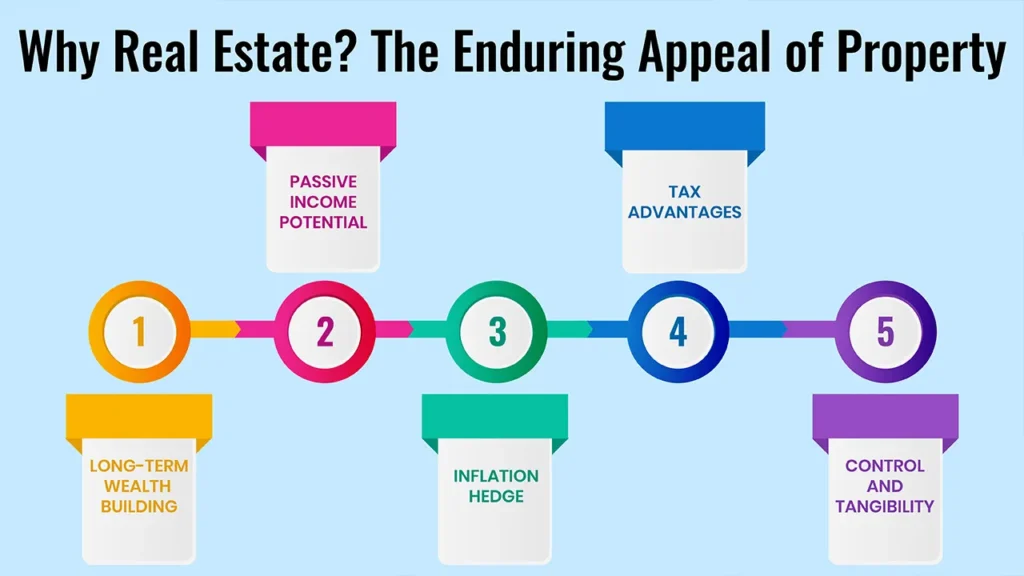Fed up with your money just languishing there? Imagine it working for you, accumulating wealth as you sleep. Real estate investment represents a compelling path to wealth, and this guide will help you get started investing in real estate property.
We’ll cover the most important concepts, including the benefits of real estate and actionable tips for starting out. Whether you are a novice investor or just interested in diversifying your portfolio, this guide is for you.
Unlock the potential of real estate to diversify your investment portfolio. Find expert tips and strategies to achieve financial growth and stability.
Why Real Estate? The Enduring Appeal of Property

- Long-term Wealth Building: Values of property appreciate with time, leading to substantial wealth creation. Real estate investment is an excellent foundation for a solid financial future.
- Passive Income Potential: Rent providing an ongoing influx of cash makes the purse strong and enables one to save and reinvest (in more property).
- Inflation Hedge: Real estate can hedge against inflation, preserving your purchasing power over time.
- Tax Advantages: There are potentially deductions and depreciation benefits and the rules for what are known as 1031 exchanges (there are many rules, and it is generally the best plan to seek a professional with experience in this complex manoeuvre).
- Control and Tangibility: Real estate investments are physical assets you can touch, and that means stability and security.
Before You Start: Essential Foundations for Aspiring Investors
Financial Health Check
- Good Debt Vs. Bad Debt: Determine the Difference Learn how to manage existing debt so that it doesn’t take away from your financial standing.
- Save your Emergency Fund. Save your emergency fund and build it up to be a bit more robust when compared to the norm of 3-6 months of expenses that people stress over.
- Good Credit Score: It’s important to have a credit score in good standing to receive financing at lower interest rates.
Setting Clear Goals
Define your objectives in terms of investment, such as passive income purpose, target for capital appreciation, and early retirement. Discriminate between short (and long) range objectives that will shape the strategy.
Education is Key
Invest in your knowledge by those books, podcasts, online courses and mentorship which you trust the most. It is essential to be familiar with the local real estate cycles and trends as you make critical decisions.
Assembling Your Team
Find the necessary professionals to help you on your investment path, such as a reputable realtor, an educated loan officer, an attorney, an accountant and even a property manager.
Most Popular Real Estate Investment Strategies for Beginners
1. Rental Properties (Long-Term)
Concentrate on residential (single-family, multi-family) properties as a means of income. It could be the concept of buying properties and renting them out for predictable, monthly cash flow, albeit with landlord responsibilities that can be transitioned to the use of a property management service.
2. Real Estate Investment Trusts (REITs)
Owning a portfolio of income-generating properties via the public markets provides liquidity, diversification among a range of property types, and professional management. But it can have less direct control over specific IMTs of metadata than direct ownership.
3. Real Estate Crowdfunding
This also pools money with other investors to fund large real estate projects, so you don’t have to fork over a tonne of money to get into commercial or large residential projects. But investments may be less liquid than REITs, and control is minimal.
4. House Hacking
Owner-occupied rentals – Housing costs can be reduced through purchasing a multi-unit property (e.g., duplex, triplex) in which you live in one unit and rent out the others – This also offers first-time landlords a taste of on-the-ground landlording experience. But that depends on having to live on the property, and that might pose a privacy issue.”
5. Market Research
Evaluate the critical factors — such as population growth, job growth and median income patterns. Look into rental demand, average rental prices and vacancy rates, and the amenity and future infrastructure plans for the area.
7. Neighborhood Analysis
Evaluate factors such as the quality of school systems, the area’s crime rate and property value history. Find out if there are any planned development projects in the area.
8. Property Analysis
Do a complete cash flow analysis—projection and calculation of the rental income against every expense. Familiarise yourself with terms such as ‘Cap Rate’, ‘Return on Investment’ (ROI), and ‘Gross Rent Multiplier’. Closely inspect the condition of the property itself and figure out what real estate repairs or renovations you’ll need to make.
9. Networking
Network with local real estate agents, other investors, and residents for leads and insights.
Funding The Dream Of Real Estate: How Various Strategies Stack Up
- Traditional Mortgages: Consider such options as conventional loans, FHA loans and VA loans (if you are a veteran). Know the minimum down payment and interest rate.
- Hard Money Loans: These are short-term, high-interest loans that will be used for quick acquisition and rehab deals.
- Private Money Lenders: People often have more flexibility when borrowing from individuals than from a traditional bank.
- Seller Financing: Under this collision, the property seller is turning out to be the lender, thereby lowering the vast dependence on banks.
- BRRRR as in “Buy, Rehab, Rent, Refinance, Repeat: this dynamic system gives you the ability to grow your real estate portfolio using the equity from the properties you acquire.
Taking Care of Your Investment: From Tenant Selection to Residential Maintenance
- Tenant Screening: I’m assuming you have the service right out of the leg iron; no suggestion that you have no screening, just trying to help you. You should, of course, always protect Fair Housing laws when you screen.
- Lease Agreements: Prepare comprehensive lease documents covering all the important terms and legalities to save your property investment.
- Rent Collection and Evictions: Create procedures for swift rent collection and learn the laws and numbers to evict when necessary.
- Property Maintenance and Repairs: Establish a maintenance schedule, and have plans for emergencies and how to locate trustworthy contractors.
- Hiring a Property Manager (Optional): If you’re too busy or you live a great distance from the property, you may want to hire a property manager. Learn what to consider when choosing a qualified property management company.
Common Challenges and Strategies for Overcoming Them
- Vacancy Periods: Put measures in place to reduce downtime between tenants, for example, strong marketing and proactive tenant retention.
- Problematic Tenants: Learn your legal recourse and how to prevent problems in the first place during the screening process.
- Unexpected Repairs: Keep a good reserve fund for emergencies and unexpected costs so you can take care of major repairs without going into debt.
- Market Downturns: Take the long view and make sure you have the financial staying power to survive swings in the economy.
- Legal Issues: For any complex dispute or question of compliance, contact attorneys to preserve your investment.
We take a closer look at why multitasking is not an asset when it comes to investing in real estate (or anything for that matter).
Conclusion
All in all, beginner real estate investing is realistic, and there are many opportunities to do so. With the tactics provided in this guide, you can open the door to financial independence through real estate investment.
Call to Action
Get the ball rolling on your real estate dreams! Get the real estate investment checklist for FREE and subscribe to get the best tips!
Frequently Asked Questions
How much can I invest in real estate with little money?
The investment minima can range from hundreds to thousands of dollars, but some crowdfunding sites let you get started with just a few hundred dollars.
Is investing in real estate risky?
It is easy to take issue with the pros and cons of the matter, but here’s what I can clarify: Like any investment, real estate comes with risks — market fluctuations, tenant problems, etc. However, if properly researched and managed, these risks can be minimised.
When do you start to make money in real estate?
There is a range of returns based on the nature of the investment, but many investors start seeing cash flow from rental properties in just a few months from closing on said property.

Leave a Reply